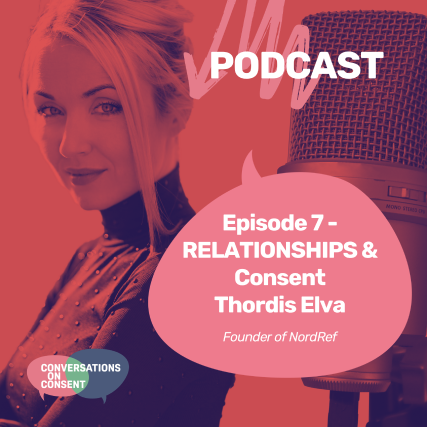RELACIONES
& CONSENTIMIENTO
Únete a la conversación sobre:
RELACIONES & CONSENTIMIENTO<span data-metadata="">
<span data-metadata="">Con Thordis Elva (NORDREF)
Thordis Elva, fundadora y presidenta de NORDREF, se adentra en una conversación sobre el consentimiento en las relaciones, los límites y el perdón.
Key Terms and Definitions
Here we clarified key terms and definitions to understand the topic better.
Domestic abuse, also called “domestic violence” or “intimate partner violence”, can be defined as a pattern of behaviour in any relationship that is used to gain or maintain power and control over an intimate partner. It can occur within a range of relationships including couples who are married, living together or dating. Domestic violence affects people of all socio-economic backgrounds and education levels.
“Marital rape can be defined by any non-consensual vaginal, anal or oral penetration of the body of another person where the penetration is of a sexual nature, with any body part or with an object, as well as to any other non-consensual acts of a sexual nature, by a spouse or ex-spouse or by a former or current partner with whom a victim of rape is or has been living in a partnership recognised by the national law in many countries. Causing a spouse or ex-spouse or a former or current partner to engage in non-consensual acts of a sexual nature with a third person is also considered marital rape.
“A toxic relationship is a relationship between two or more people who are constantly fighting or on thin ice with each other but trying to maintain the relationship.”
Did you know… ?
Here are facts and figures on the topic.
One in three adolescents in the U.S. is a victim of physical, sexual, emotional or verbal abuse from a dating partner, a figure that far exceeds rates of other types of youth violence.
Recent studies from Ireland and the USA have found negative social interactions and relationships with partners/spouses increase the risk of depression, anxiety and suicidal ideation, while positive interactions reduce the risk of these issues.
UN Women estimates that 736 million women have faced intimate partner violence, sexual violence or more at least once in their life.
Intimate Partner Violence disproportionately affects women. Women are at significantly higher risk than men of experiencing Intimate Partner Violence and of sustaining serious injuries.
Estimates published by WHO indicate that globally about 1 in 3 (30%) of women worldwide have been subjected to either physical and/or sexual intimate partner violence or non-partner sexual violence in their lifetime.
¿Quieres ayudar a difundir el mensaje? Comparte nuestra animación sobre las RELACIONES
Aquí tienes unos datos rápidos e información fácil de entender sobre este tema. No dudes en publicarlo en tus cuentas de redes sociales para que tus amigos participen.
Comparte ahora:
Relationship Resources
Check out the following resources to learn more about nudity and consent.
The Forgiveness Project
REGISTERED CHARITY
The Forgiveness Project provides resources and experiences to help people examine and overcome their own unresolved grievances.
Fear 2 Freedom
EDUCATIONAL PROGRAMME
South of Forgiveness
BOOK
South of Forgiveness is an unprecedented collaboration between a survivor and a perpetrator, each equally committed to exploring the darkest moment of their lives. It is a true story about being bent but not broken, facing fear with courage, and finding hope even in the most wounded of places.
Myth Busters
Relationships and consent are topics that are often misunderstood because of the myths surrounding them, here we want to clean up some of the most prominent misconceptions.
How to…
Check out these guidelines that help you to have conversations on consent.
… show respect to your spouse or partner.
Advice: Feelings change and all feelings and moods have value when it comes to agreeing to consensual sex. Make an effort to understand how your partner feels at all times. Also while having sex with them.
... support friends in toxic relationships.
Advice: Listen to friends when they speak about any potential psychological violence and ask them questions to engage them in talking about what they are going through. It is very important to keep lines of communication open and not to have them isolate themselves.
… heal from unhealthy relationships.
Advice: It is very important to process what has happened to seek professional support when healing from violence or abuse in relationships and marriage. Keep in mind that your worth never depends on having to be in a relationship and it is okay to take time for yourself to heal.
Relationships and Consent Cases
Here we highlight prominent cases.
Evan Rachel Wood and Marilyn Manson
CASE:
Evan Rachel Wood (actress) has claimed Marilyn Manson (singer) “horrifically abused” her during their relationship from 2007 to 2010. Manson has denied the allegations, saying they were “horrible distortions of reality”. Evan Rachel Wood has testified to the US Congress that Manson “had hidden an addiction to drugs and alcohol from her”, and “had bouts of extreme jealousy, which would often result in him wrecking our home, cornering me in a room, and threatening me”.
ANALYSIS:
Marilyn Manson has not been formally accused, however, several women have also claimed to have suffered abuse during their relationships.

Johnny Depp and Amber Heard
CASE:
Johnny Depp and Amber Heard were married from 2015 to 2017. In 2016, Amber Heard filed for divorce and accused Johnny Depp of being abusive throughout their relationship. In 2017, an agreement was reached and the divorce was finalised. In 2018, Amber Heard wrote an op-ed for The Washington Post saying she was abused. Johnny Depp sued Amber Heard for defamation in 2019 and also sued the publishers of The Sun in England for calling him “a wife-beater”. In 2020, the High Court of Justice of England and Wales ruled that Johnny Depp had lost his case against The Sun and that the majority of Heard’s allegations had been proven to a civil standard. Depp has also accused Heard of hitting him. The case is still ongoing in the USA.
ANALYSIS:
Although the courts in England deemed that The Sun was writing the truth when they called Depp a “wife-beater”, the case of defamation is still ongoing in the USA with new evidence and accusations that Amber Heard also hit and was violent towards Depp.

Know Your Rights
The protection of consent in relationships is of utmost importance and it is important to understand the rights you have in this domain.
Legal interpretations of Consent in Relationships
According to each country data protection and privacy rights differ.
France
The notion of “marital duty” – the requirement to have sexual relations within a marriage – no longer exists in French criminal law or in France’s modern civil code which dates from 1804. But several articles in the civil code allow judges to offer rather archaic interpretations in some thorny divorce cases. Articles 212, 215 and 242 of France’s civil code lay down the fact spouses must pledge mutual help, respect, fidelity and communal life. Some jurists consider “communal life” to be the sharing of a roof, table and bed. Non-consenting sexual relations within marriage were criminalised in 2006 when the concept of marital rape was introduced in the French Penal Code.
Law: French Penal Code – Article 222
(Legifrance)
Spain
The Spanish government has approved a new law that explicitly classifies non-consensual sex as rape. Ministers approved the bill called “only yes means yes” to protect the right to sexual freedom and ban all sexual violence. Under the new law, any penetration without consent will be seen as rape, punishable by between four and 10 years in jail. Aggravated rape will have a higher prison term with a maximum of 15 years, and the punishment will be higher if the victim is the rapist’s wife or former partner. The law does, however, require a new rule under Spain’s criminal code and Parliament could still change their minds before it becomes official. Until the new law is made official, Spain’s current controversial rape law still stands and does not consider sexual abuse or assault rape unless violence and intimidation are involved. In Spain, crimes against sexual freedom are regulated in Title VIII of Book II of the current Criminal Code. A distinction is made between the following types of offences:
Law: Spanish Penal Code
(Noticias Juridicas)
United Kingdom
Rape is defined under Section 1 of the Act as one person’s intentional penetration of the vagina, anus or mouth with the penis, whereby the other person has not consented to the act. Marital rape will also be considered as a form of domestic violence and may also include allegations of assault or that the accused has acted in a controlling and coercive manner. Implied consent is not sufficient – a spouse should always ensure that their partner has freely provided their consent before engaging in any sexual activity.
For the act of marital rape to be prosecuted, the prosecution must prove that:
1. Penetration of the anus, mouth or vagina occurred
2. The act of penetration was intentional
3. The complainant did not consent to the act of penetration
4. The defendant did not believe – within reason – that the complaint had consented to the act
Law: Sexual Offences Act 2003
(Sexual Offences Act 2003)
We are evolving as we share
Let us know about your comments and feedback on the information provided on our website. Is there anything to be added or adjusted? Simply contact us.

Stay up to date with the latest podcasts, new resources, and progress with our petition.





